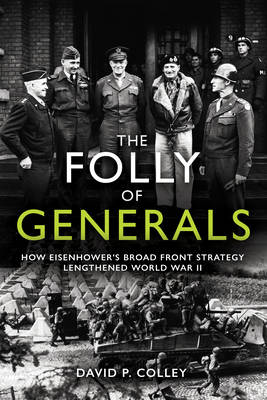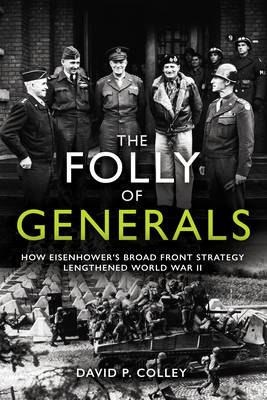
En raison d'une grêve chez bpost, votre commande pourrait être retardée. Vous avez besoin d’un livre rapidement ? Nos magasins vous accueillent à bras ouverts !
- Retrait gratuit dans votre magasin Club
- 7.000.000 titres dans notre catalogue
- Payer en toute sécurité
- Toujours un magasin près de chez vous
En raison de la grêve chez bpost, votre commande pourrait être retardée. Vous avez besoin d’un livre rapidement ? Nos magasins vous accueillent à bras ouverts !
- Retrait gratuit dans votre magasin Club
- 7.000.0000 titres dans notre catalogue
- Payer en toute sécurité
- Toujours un magasin près de chez vous
The Folly of Generals
How Eisenhower's Broad Front Strategy Lengthened World War II
David P Colley
Livre relié | Anglais
34,95 €
+ 69 points
Description
"Throughout the book, Colley uses postwar comments by German generals to support his arguments." -- New York Journal of Books
Imagine how many lives would have been saved had the war in Europe finished in December 1944 instead of five months later... David Colley analyzes critical mistakes made by the Allied supreme commander, General Dwight Eisenhower, in the last nine months of the war. He argues that had Eisenhower been more adept at taking advantage of several potential breakthroughs in the Siegfried Line in the fall of 1944 the war in the European Theater of Operations might have ended sooner.
The book details the American penetration of the Siegfried Line in mid-September and their advance into Germany at Wallendorf before the troops were called back. It also examines in detail operations in the Stolberg Corridor and the actions of General Lucian Truscott. It compares the battles at Wallendorf and Stolberg with Operation Market Garden, and assesses the effectiveness of these operations and the use of the troops. Eisenhower later called off another operation in November 1944, already in progress, to cross the Rhine and destroy the German 1st Army north of Strasbourg. American and German generals believe this operation would have shortened the war.
The Folly of Generals explores these potential breakthroughs--along with other strategic and tactical mistakes in the ETO and in Italy, some never before revealed--that might have shortened the war by a considerable margin.
Imagine how many lives would have been saved had the war in Europe finished in December 1944 instead of five months later... David Colley analyzes critical mistakes made by the Allied supreme commander, General Dwight Eisenhower, in the last nine months of the war. He argues that had Eisenhower been more adept at taking advantage of several potential breakthroughs in the Siegfried Line in the fall of 1944 the war in the European Theater of Operations might have ended sooner.
The book details the American penetration of the Siegfried Line in mid-September and their advance into Germany at Wallendorf before the troops were called back. It also examines in detail operations in the Stolberg Corridor and the actions of General Lucian Truscott. It compares the battles at Wallendorf and Stolberg with Operation Market Garden, and assesses the effectiveness of these operations and the use of the troops. Eisenhower later called off another operation in November 1944, already in progress, to cross the Rhine and destroy the German 1st Army north of Strasbourg. American and German generals believe this operation would have shortened the war.
The Folly of Generals explores these potential breakthroughs--along with other strategic and tactical mistakes in the ETO and in Italy, some never before revealed--that might have shortened the war by a considerable margin.
Spécifications
Parties prenantes
- Auteur(s) :
- Editeur:
Contenu
- Nombre de pages :
- 264
- Langue:
- Anglais
Caractéristiques
- EAN:
- 9781612009742
- Date de parution :
- 31-03-21
- Format:
- Livre relié
- Format numérique:
- Genaaid
- Dimensions :
- 160 mm x 231 mm
- Poids :
- 544 g

Les avis
Nous publions uniquement les avis qui respectent les conditions requises. Consultez nos conditions pour les avis.






